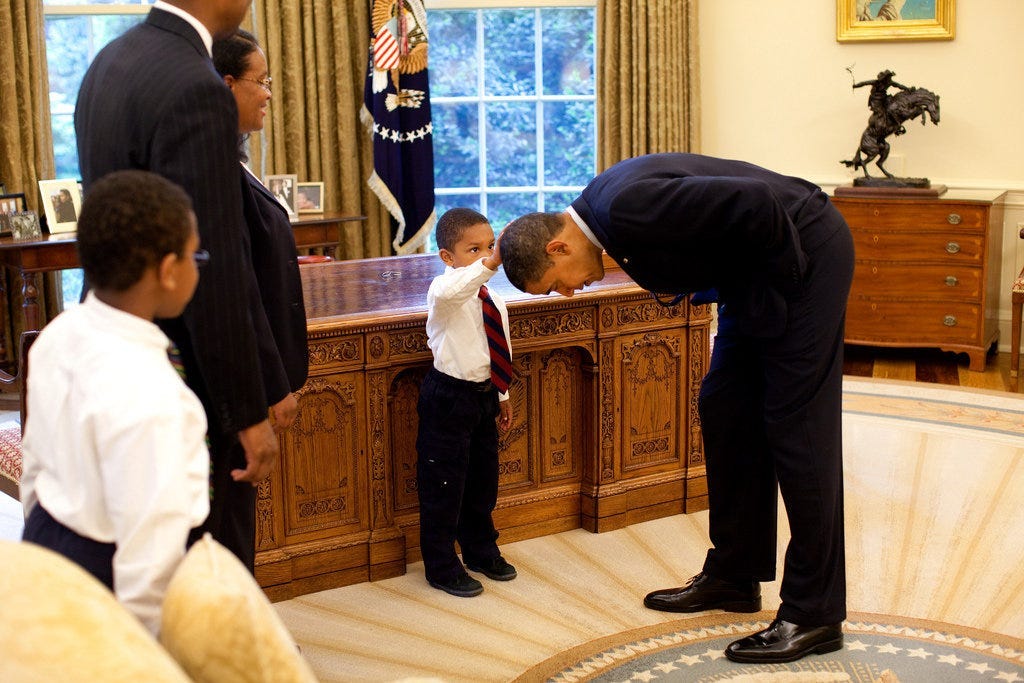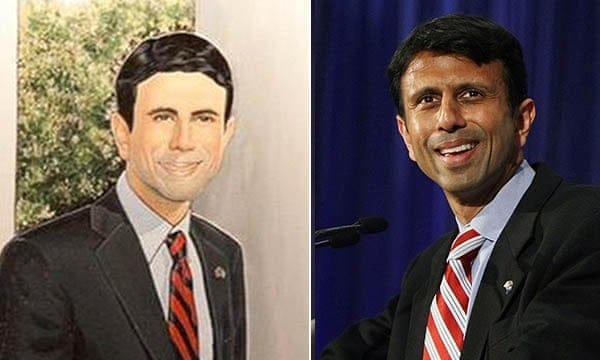Bobby, Nikki, Kamala, Vivek, and me
It means so much to see people who look like you
Here’s a lede for you: I’m retiring. Starting on October 1, I’m going to be working as an Election Fellow at Decision Desk HQ, covering the 2024 race. I’ll still be writing columns for the Yale Daily News, and who knows, I might come back for the occasional guest post here.
Of course, I’m beyond excited for this new chapter, but I’m going to miss Slow Boring. So, from the bottom of my heart: thank you. Thank you to Matt and Kate for taking a chance on a kid who cold-emailed. Thank you to the subscribers I’ve talked to in the comments over the last two years (even the ones who get on my nerves). Above all, thank you to everyone who took the time out of their day to read my takes. Here’s my complete catalog — now all unlocked:
Democrats have changed a lot since 2012 (with Matt)
Tax increases are the best cure for inflation (with Simon)
Next week, I’m going to do one more mailbag as my farewell. But today, I wanted to write about something a little more personal: my race.
“Milan, rhymes with Dylan”
Since my first day of kindergarten, I’ve been correcting people on how to pronounce my name. “Milan, rhymes with Dylan, not like the city in Italy.”
I’m Indian American. My mother is Bengali, my father is Punjabi. Mama moved to Cambridge, Massachusetts when she was 12; Baba moved to Youngstown, Ohio when he was 11. I was born in Brigham and Women's Hospital in Boston in 2003.
It’s always been hard for me to talk about my race. It’s hard for me to write this for a mostly white audience. But I’m doing this for that little brown boy just like me, so he knows that there are people out there who understand what it’s like to be him — and that it gets better.
Growing up, I was very insecure about being Indian. In many ways, I still am. The stereotype of an Indian man in America is not particularly flattering: a convenience store owner or the nerdy, unathletic kid. You feel unattractive, undesirable, and frankly unmanly. Asian men and Black women are the least likely to get matches on dating apps. It’s hard to think of yourself as physically good-looking or worthy of someone else’s romantic affection.
To some extent, it feels like it’s socially acceptable to make unkind jokes about you in a way that it just isn’t (in polite company, at least) about other races — Apu was a regular character on The Simpsons until 2017 — and the implicit justification is that it’s okay because on average, Indian Americans are doing pretty well for themselves, so you should just smile and take it on the chin. But that doesn’t make it hurt any less.
Because we’re such a small share of the population, it’s hard to find people to talk to about this. In one sense, it’s like being any other kind of racial minority in America: you’re not a member of the predominant culture, you look and feel different. In another sense, it’s not. For many Black and Hispanic Americans, there’s a certain subculture you can fit into and find belonging in. There are famous people who look like you who can serve as role models. When I was a kid, I didn’t see anyone who looked like me on American TV. There were Bollywood actors in the movies I watched at my grandparents’ house, but I had grown up in America my whole life. I don’t speak anything but English and I didn’t — and still don’t — feel like I was fully connected, in some fundamental sense, to India. But even now, at 20 years old, I don’t quite feel at home in America.
When my brother was a child he was on the no-fly list because his first name is Kabir. Baba and I get “randomly” checked by TSA. My teacher once asked me if I was coming to parent-teacher conferences to translate for Mama, even though my parents grew up here and spoke perfect English. I don’t want to hyperbolize and make it seem like these things were catastrophic violations. But they sting, and they add up, and they make you feel like you don’t quite belong. Like you’re always just a little bit on the outside looking in.
“A skinny kid with a funny name”
Barack Obama is my hero. I remember being in first grade when he was elected president. I remember watching the news when he got re-elected with Mama. Of course, I supported his policies, especially as I grew older and began to actually understand politics. Joe Biden, I think, has similar politics and favors basically the same policies as his old boss. And he’s arguably gotten bolder legislation passed. But he’s not my hero, because — through no fault of his own — he doesn’t know what it’s like to grow up as a nonwhite man in America.
I was a chubby kid, not a skinny one, but I know what it’s like to have a funny name. I know what it’s like to put up with the little jokes and the small digs and that quiet feeling that you’re not quite accepted for who you are, that you need to act like someone else to fit in. And when I was growing up, it made me so happy that a man with brown skin like mine could be the president of the United States. I felt a bit like that little Black boy who touched Obama’s hair in the Oval Office. I felt like he, on some personal level, understood what I was going through and that if he could overcome it and find belonging here then I could, too.
Of course, Obama is Black, and I’m not. Anecdotally, I can tell you that a lot of second-generation brown guys like me gravitate toward Black culture to find a sense of belonging in America. You listen to rap because you can relate to the lyrics about feeling like an outsider in your own country. Some people take it too far, like that one cousin who’s a little too into Drake and doesn’t stop rapping along when the n-word comes up in a song. And some older Indian Americans are a bit racist towards Black people, not necessarily out of spite, but because of a sense that as a newcomer, you don’t want to tie yourself to the group that gets the short end of the stick.
It’s tricky to toe the line between respectfully appreciating the ways Black art talks about that feeling of otherness and being the guy who tries to ape the “cool” parts of the culture without having to live with the full burden of that particular sort of discrimination. But when I was young, there weren’t any Hasan Minhajs or Aziz Ansaris on TV, so I watched Key & Peele and I made President Obama my role model.
“A paradise within thee, happier far”
I used to make a lot of jokes about Bobby Jindal because his legal name is Piyush, but he goes by his home name, Bobby, in public.
In Indian families, you have a nickname and within your natal family, nobody really calls you anything else. It’s a very personal and very private thing: my maternal grandparents would never refer to Baba by his home name, and I would find it bizarre if my parents called me “Milan” in private. I always thought it was borderline insane that Jindal went by his home name in public. I thought he was trying too hard to seem white.
When I heard about the very fair-skinned portrait of himself that he had in his office as governor of Louisiana, my first thought was “who do you think you’re fooling, man?” I felt similarly about Nikki Haley, who I thought also tried too hard to pass based on her complexion, her married surname, and the fact that she goes by her middle name rather than her first name, Nimrata. I thought that both she and Jindal were doing too much by converting and being so publicly Christian. It made me angry because I felt like they were trying to hide something that shouldn’t have to be hidden.
But the other night I went down a rabbit hole and ended up on Jindal’s Wikipedia page. And as I read the “Early life and education” section, I cried.
Baba has told me how hard it was for him to grow up as a short, skinny brown Sikh boy who wore a patka in Youngstown, Ohio in the 80s. How much he got picked on and bullied. I grew up in Cambridge, Massachusetts, and I still felt the pressure to “act white” and try to fit in. Even in my first year of college, I let my literature professor mispronounce my name for the whole semester because I was too scared to correct him. I can’t imagine what it must’ve been like to grow up as a Hindu boy in the Deep South. I can’t look at myself in the mirror and honestly say that I would’ve done any differently than Jindal if I had been in his shoes.
I disagree with Jindal and Haley on most policy issues. I agree more with Kamala Harris, but I understand why she’s publicly perceived as a Black woman more than an Indian woman. I really disagree with Vivek Ramaswamy. But it makes me happy that he’s running as Vivek and not Victor. That he’s a Hindu, even if he doesn’t talk about it much. That even though I think he’s an extremist nut, he’s not hiding who he is as an Indian man. Unlike Haley, he can’t — he’s not light-skinned enough to pass as white. I’m not either. I used to wish I could. I don’t anymore. And it makes me so happy that my kids will grow up and see people who look like them in the public sphere. I hope it will be easier for them to love themselves for who they are than it was for me to learn to.




Nice piece, kid. It's been a pleasure living under your benevolent dictatorship.
I am not sure you appreciate the violence you inflicted on this readership by specifying your birth year as 2003. We always knew as an intellectual exercise inferred from your public collegiate matriculation, but still!
Best of luck! May the gainz be ever in your favor